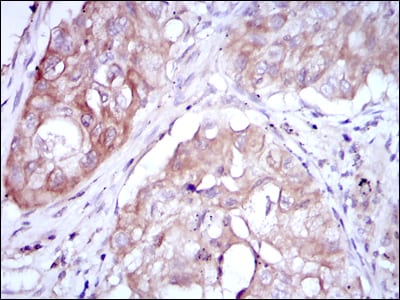



| WB | 1/500 - 1/2000 | Human,Mouse,Rat |
| IF | 咨询技术 | Human,Mouse,Rat |
| IHC | 1/200 - 1/1000 | Human,Mouse,Rat |
| ICC | 技术咨询 | Human,Mouse,Rat |
| FCM | 咨询技术 | Human,Mouse,Rat |
| Elisa | 1/10000 | Human,Mouse,Rat |
| Aliases | MTHFR |
| Entrez GeneID | 4524 |
| clone | 5D3 |
| WB Predicted band size | 75kDa |
| Host/Isotype | Mouse IgG1 |
| Antibody Type | Primary antibody |
| Storage | Store at 4°C short term. Aliquot and store at -20°C long term. Avoid freeze/thaw cycles. |
| Species Reactivity | Human,Rat |
| Immunogen | Purified recombinant fragment of human MTHFR expressed in E. Coli. |
| Formulation | Ascitic fluid containing 0.03% sodium azide. |
+ +
以下是关于MTHFR抗体的3篇参考文献及其摘要概述:
---
1. **文献名称**:*Human methylenetetrahydrofolate reductase: isolation of cDNA, mapping and mutation identification*
**作者**:Goyette P, Sumner JS, Milos R, et al.
**摘要**:该研究报道了人MTHFR基因的克隆及重组蛋白表达,并开发了特异性抗体用于检测酶的表达水平和活性。抗体被用于分析MTHFR基因突变(如C677T)对酶功能的影响,为后续疾病关联研究奠定基础。
2. **文献名称**:*A candidate genetic risk factor for vascular disease: a common mutation in methylenetetrahydrofolate reductase*
**作者**:Frosst P, Blom HJ, Milos R, et al.
**摘要**:研究聚焦于MTHFR C677T突变与心血管疾病的关系,通过抗体检测发现突变导致酶热稳定性降低及活性下降,揭示了该突变通过影响同型半胱氨酸代谢增加疾病风险的机制。
3. **文献名称**:*Autoantibodies against MTHFR in systemic lupus erythematosus: prevalence and clinical associations*
**作者**:Yan L, Li Q, Zhang Y, et al.
**摘要**:首次在系统性红斑狼疮(SLE)患者中发现抗MTHFR自身抗体的存在,揭示其与疾病活动性及高同型半胱氨酸血症的相关性,提示自身免疫反应可能通过靶向MTHFR加剧代谢异常。
---
**备注**:若需具体文献全文或更多细节,建议通过PubMed或Google Scholar按标题/作者检索。部分研究可能需结合“MTHFR抗体”在检测技术(如ELISA、Western blot)或自身免疫疾病中的关键词进一步筛选。
The methylenetetrahydrofolate reductase (MTHFR) enzyme, encoded by the *MTHFR* gene, plays a critical role in folate metabolism by converting 5.10-methylenetetrahydrofolate to 5-methyltetrahydrofolate, a cofactor for homocysteine remethylation to methionine. Genetic variants, particularly *C677T* (rs1801133) and *A1298C* (rs1801131), are linked to reduced enzyme activity, leading to elevated homocysteine levels and altered folate status. These polymorphisms are associated with increased risks of cardiovascular diseases, neural tube defects, pregnancy complications, and certain cancers.
MTHFR antibodies are immunological tools used in research to detect and quantify MTHFR protein expression, localization, and function in tissues or cell lines. They aid in studying the enzyme’s role in folate-homocysteine cycling, epigenetic regulation, and disease mechanisms. Commercial antibodies (polyclonal or monoclonal) are optimized for techniques like Western blotting, immunohistochemistry, or ELISA. In clinical contexts, MTHFR autoantibodies have been explored in autoimmune conditions, though their pathogenic relevance remains unclear.
Genetic testing for *MTHFR* variants, combined with homocysteine level assessments, guides personalized interventions (e.g., folate supplementation). However, antibody-based detection of MTHFR protein is primarily research-focused, complementing genetic data to elucidate molecular pathways and therapeutic targets in hyperhomocysteinemia-related disorders.
×